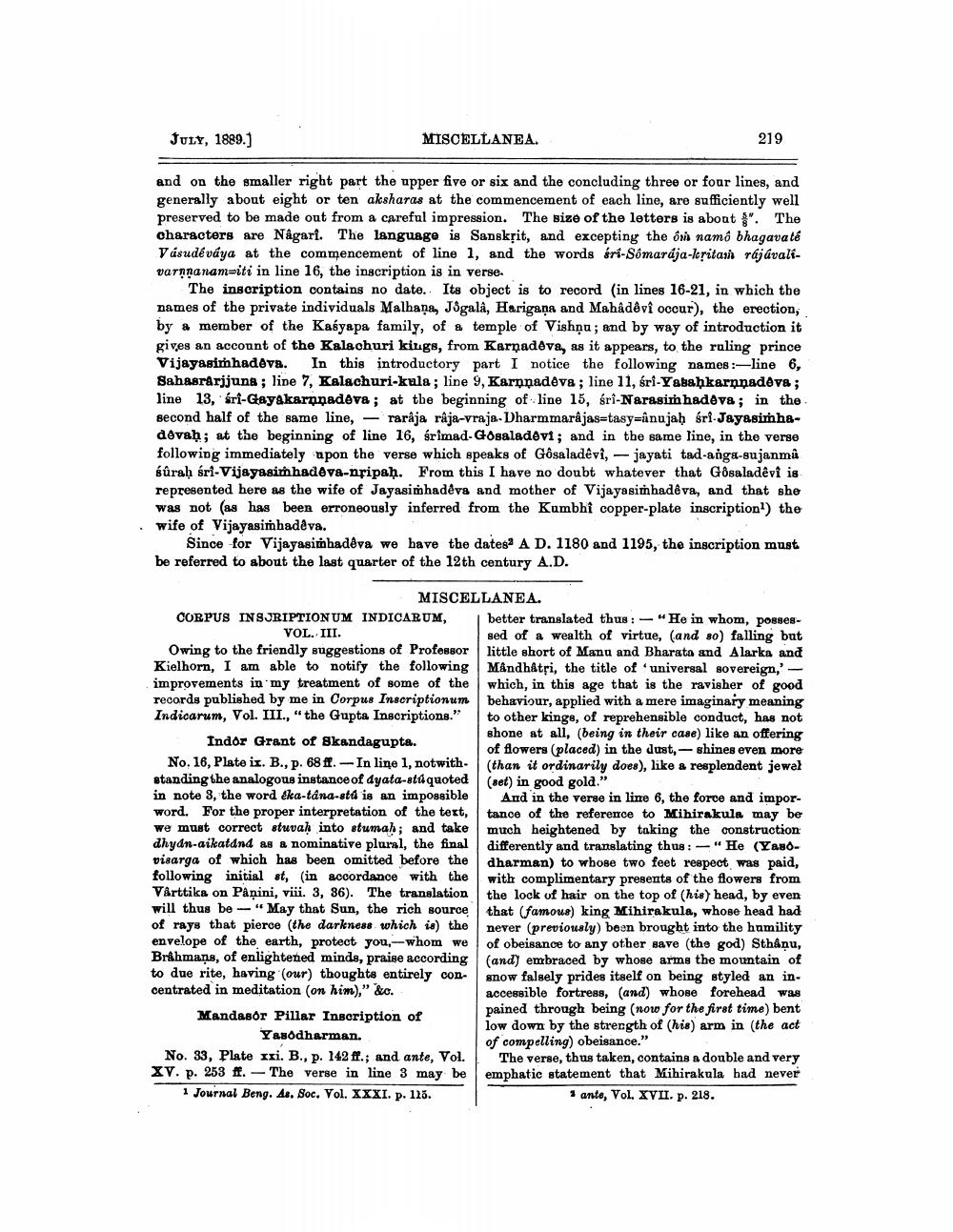________________
July, 1889.)
MISCELLANEA.
219
and on the smaller right part the upper five or six and the concluding three or four lines, and generally about eight or ten aksharas at the commencement of each line, are sufficiently well preserved to be made out from a careful impression. The size of the letters is about s". The characters are Någari. The language is Sanskřit, and excepting the ori namo bhagavaté Vásudé váya at the commencement of line 1, and the words éri-Sómarája-leritas rájávalivarnnanamwiti in line 16, the inscription is in verse.
The inscription contains no date. Its object is to record in lines 16-21, in which the names of the private individuals Malhaņa, Jógalâ, Harigana and Mahadevi oocur), the erection, by a member of the Kaśyapa family, of & temple of Vishņu; and by way of introduction it gives an account of the Kalachuri kings, from Karnadóva, as it appears, to the ruling prince Vijayasimhadeva. In this introductory part I notice the following names :-line 6, Sahasrarjjung ; line 7, Kalachuri-kala ; line 9, Karppadeva; line 11, śri-Yabahkarnnadeva; line 13, sri-Gayakarnnadeva; at the beginning of line 15, śrî-Narasim hadeva; in the second half of the same line, - raraja raja-vraja Dharmmarâjas-tasy=ânujah śrî.Jayasimhadevaḥ; at the beginning of line 16, śrimad- Gosaladevi; and in the same line, in the verse following immediately upon the verse which speaks of Gôsaladêvî, - jayati tad-anga-sujanma śûrah sri-Vijayasimhadeva-nfipaḥ. From this I have no doubt whatever that Gösaladevi is represented here as the wife of Jayasimhadeva and mother of Vijayasim hadêva, and that she was not (as has been erroneously inferred from the Kumbhỉ copper-plate inscription') the wife of Vijayasimhadeva.
Since for Vijayasimhaddva we have the dates? A D. 1180 and 1195, the inscription must be referred to about the last quarter of the 12th century A.D.
MISCELLANEA. CORPUS INSCRIPTIONUM INDICARUM, better translated thus: - "He in whom, possesVOL. III.
sed of a wealth of virtue, (and so) falling but Owing to the friendly suggestions of Professor little short of Manu and Bharata and Alarka and Kielhorn, I am able to notify the following Måndh&tri, the title of 'universal sovereign,' improvements in my treatment of some of the which, in this age that is the ravisher of good records published by me in Corpus Inscriptionum behaviour, applied with a mere imaginary meaning Indicarum, Vol. III., "the Gupta Inscriptions." to other kings, of reprehensible conduct, has not
shone at all, (being in their case) like an offering Indor Grant of Skandagupta.
of flowers placed) in the dust, - shines even more No. 16, Plate is. B., p. 68 ff. - In line 1, notwith. (than it ordinarily does), like a resplendent jewel standing the analogous instance of dyata-stú quoted (set) in good gola." in note 3, the word eka-tána-std is an impossible And in the verse in line 6, the force and imporword. For the proper interpretation of the tert, tance of the reference to Mihirakula may be we must correct stuvah into stumah; and take much heightened by taking the construction dhydn-aikatand as a nominative plural, the final differently and translating thus: "He (Yasovisarga of which has been omitted before the dharman) to whose two feet respect was paid, following initial st, in accordance with the with complimentary presents of the flowers from Vårttika on Pâņini, viii. 3, 36). The translation the lock of hair on the top of (his) head, by even will thus be - "May that Sun, the rich source that (famoue) king Mihirakula, whose head had of rays that pierce (the darkness which is) the never (previously) been brought into the humility envelope of the earth, protect you,--whom we of obeisance to any other save (the god) Sthåņu, Brahmans, of enlightened minds, praise according
(and) embraced by whose arms the mountain of to due rite, having (our) thoughts entirely con- snow falsely prides itself on being styled an incentrated in meditation (on him)," &c.
accessible fortress, (and) whose forehead was Mandasor Pillar Inscription of
pained through being (now for the first time) bent Yasodharman.
low down by the strength of (his) arm in (the act
of compelling) obeisance." No. 33, Plate xxi. B., p. 142 ff.; and ante, Vol. The verse, thus taken, contains a double and very XV. p. 253 ff. - The verse in line 3 may be emphatic statement that Mihirakula had never 1 Journal Beng. As. Soc. Vol. XXXI. p. 125.
1 ante, Vol. XVII. p. 218.




